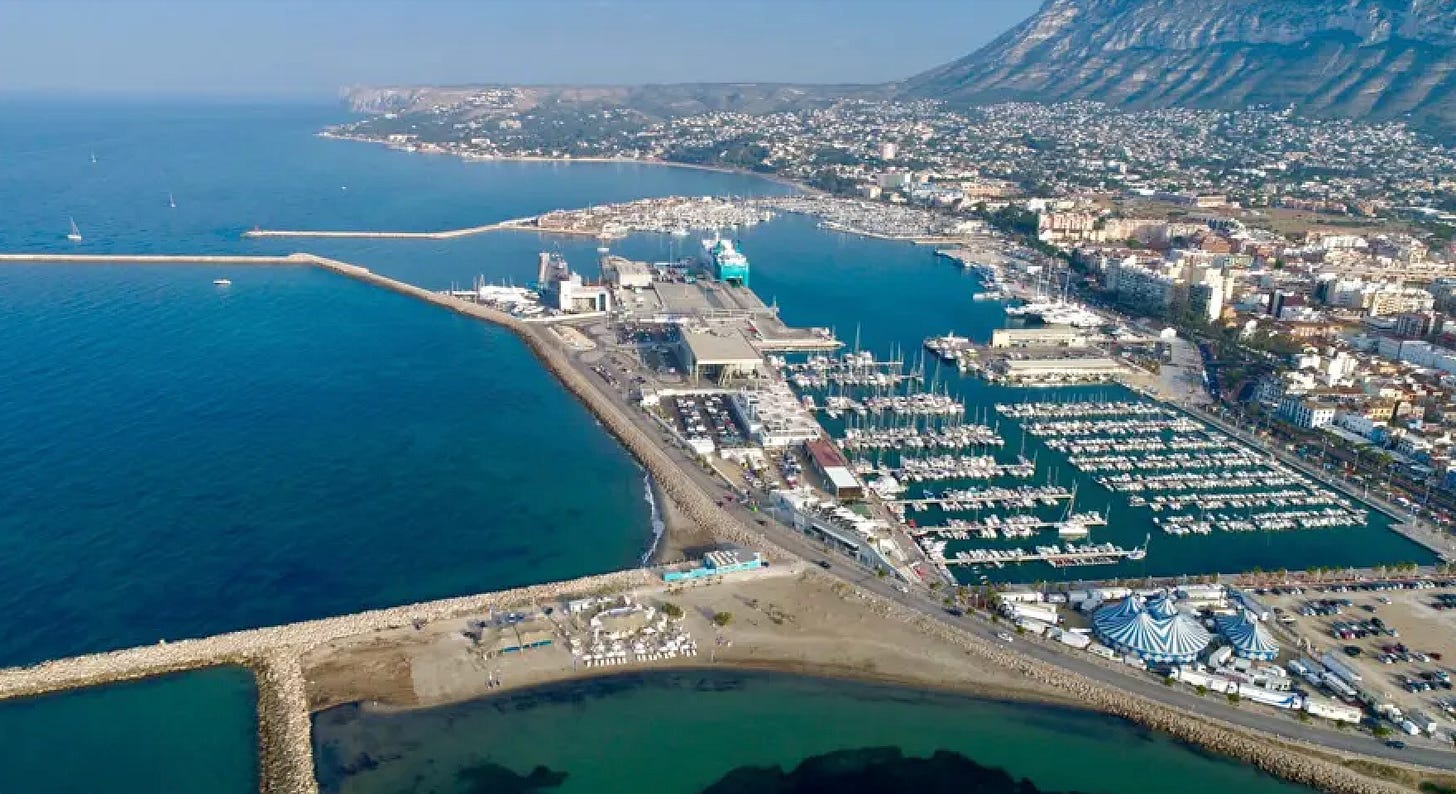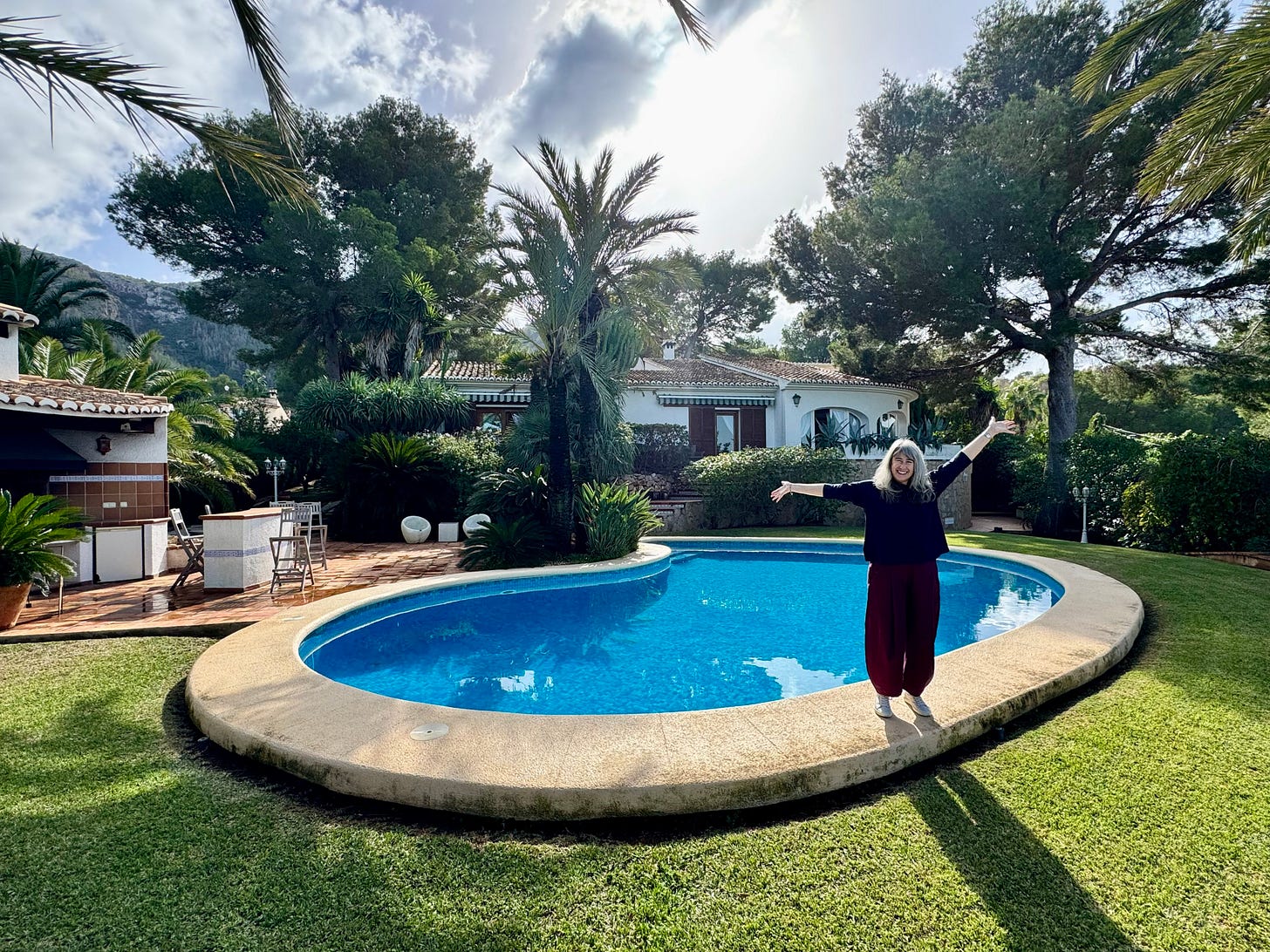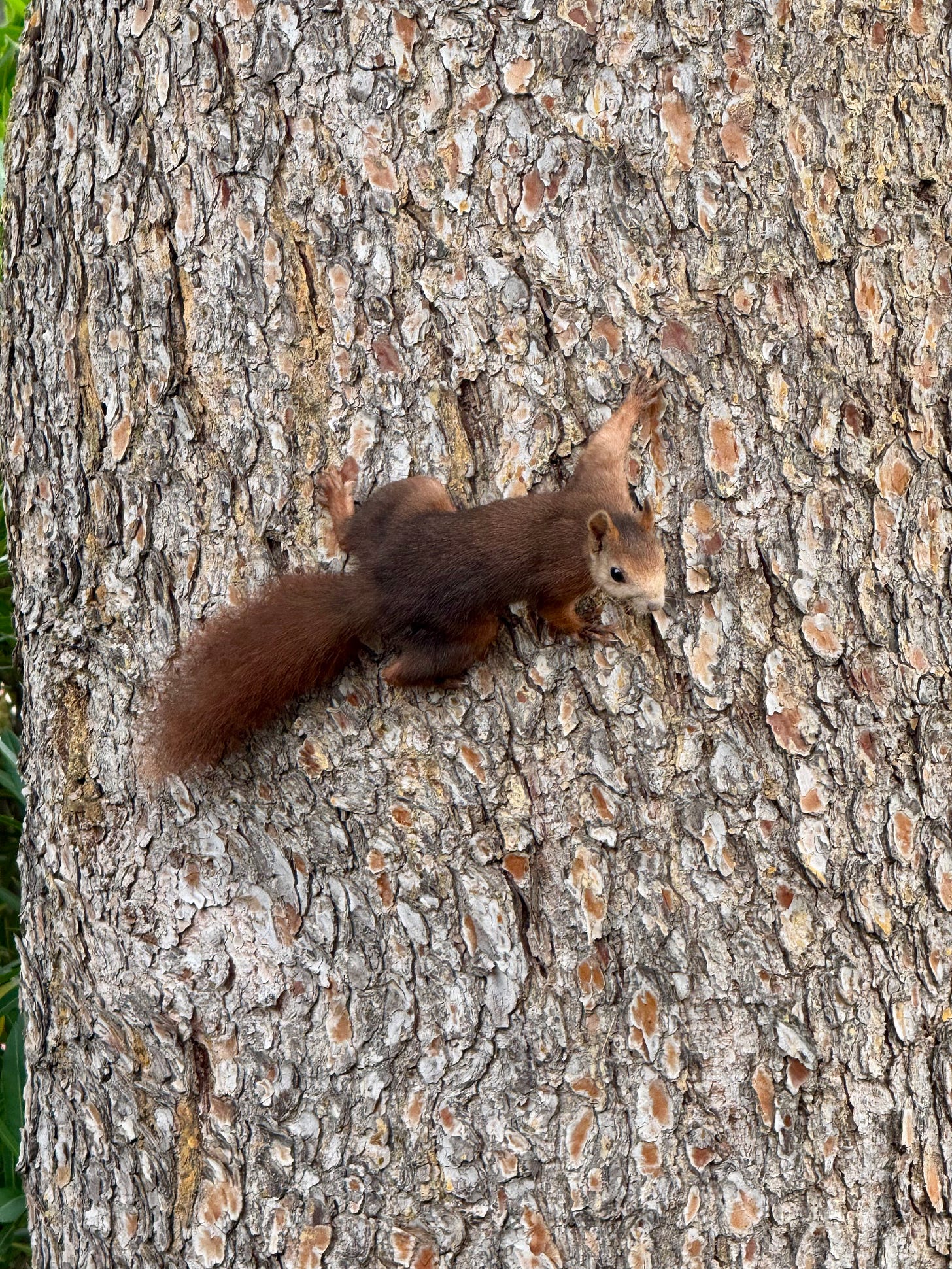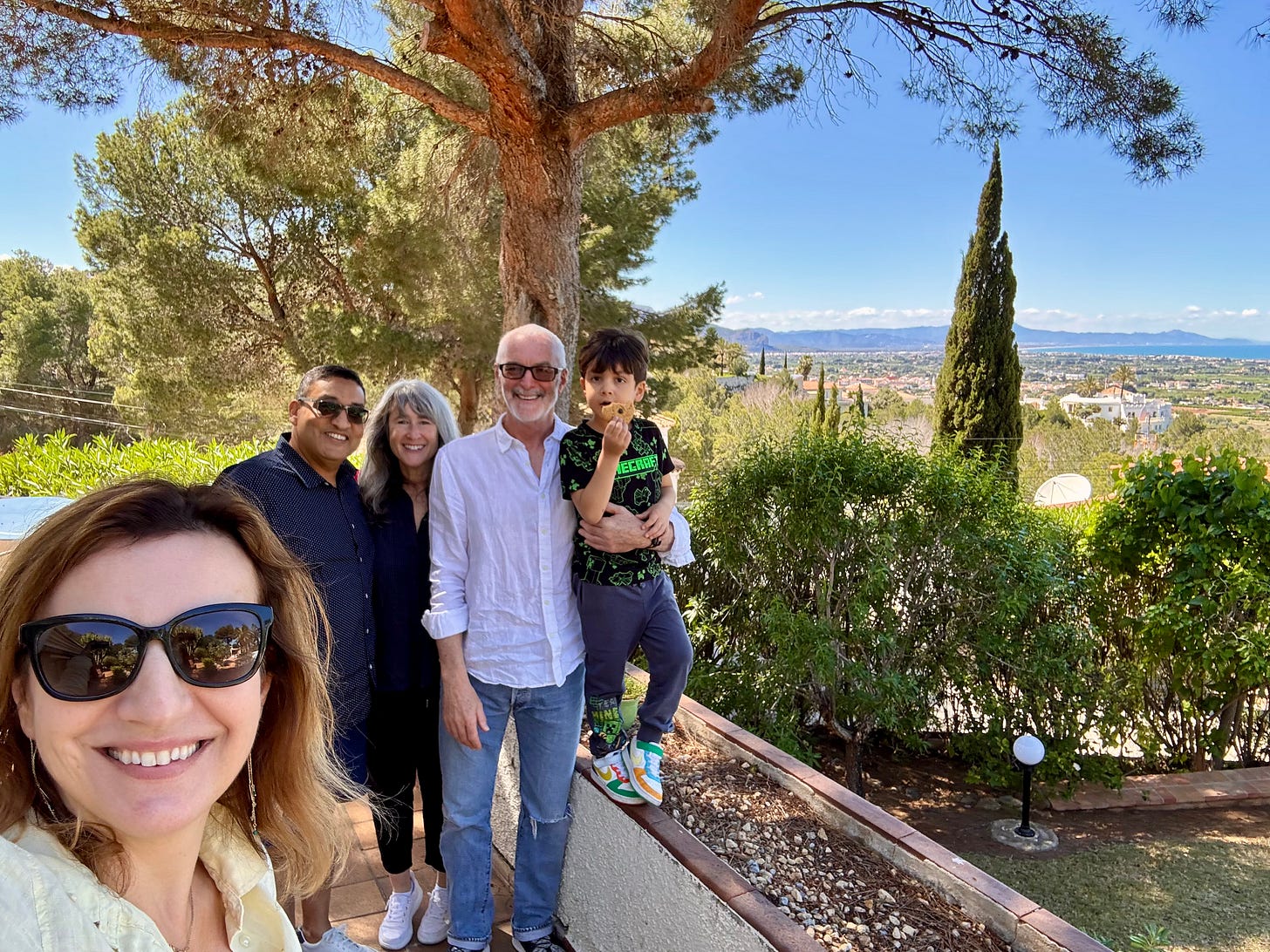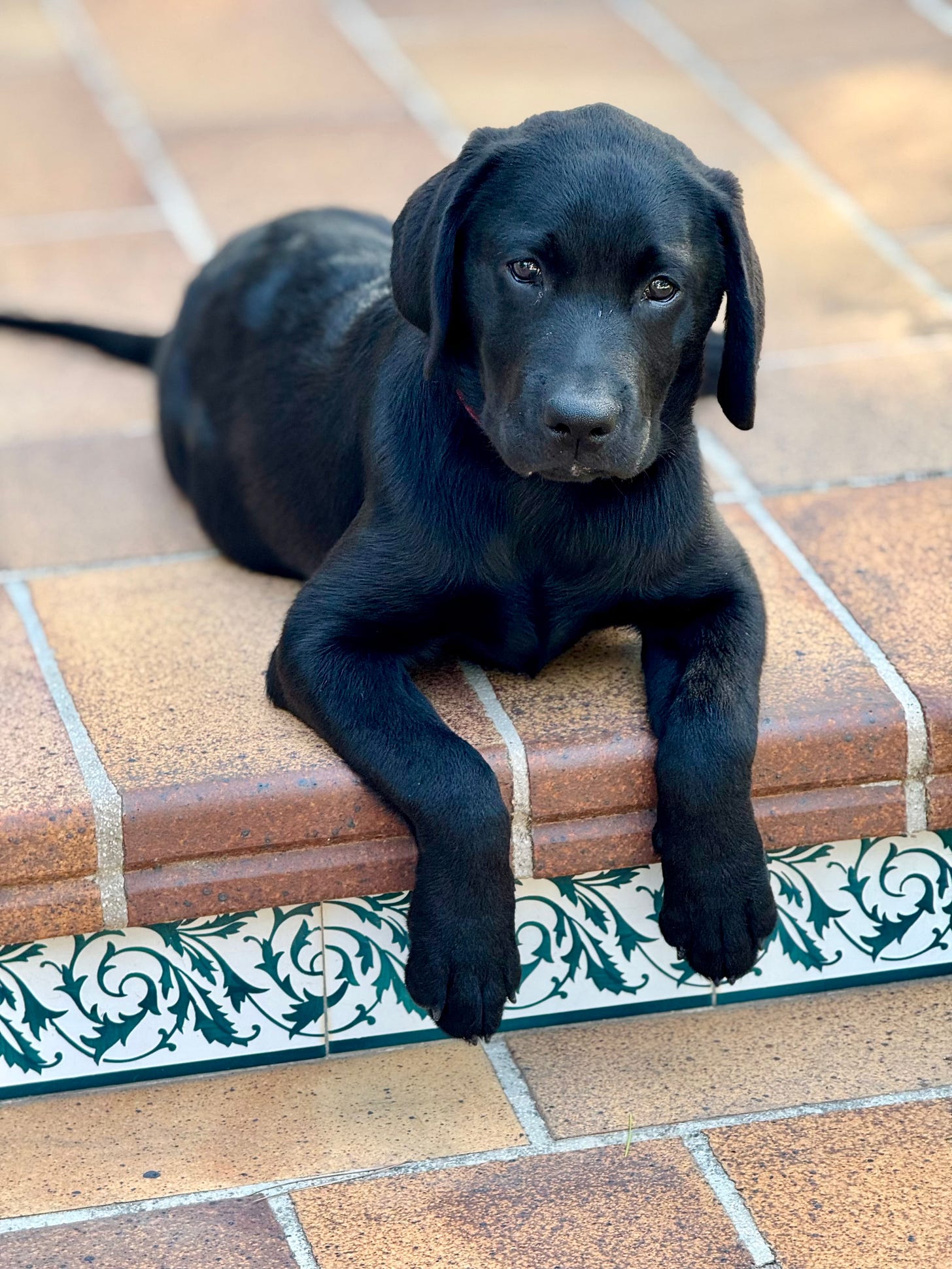From chaos, calm blooms,
routine shaped by sun and sea—
we really live here.
Exit plans, escape routes, Plan B’s and soft landings. Call it what you like—we weren’t drinking the Kool-Aid anymore. Time to get the hell out of Dodge. And we were just privileged enough to pull it off. Managed retreat. A conscious uncoupling. Not so much greener grass as calmer grass.
A year later, here we are, in Spain. And let me be clear: I’m fine. We’re fine. Not homesick, not wandering cobblestone streets muttering about Trader Joe’s, and I’m not writing this from the fetal position clutching a bottle of Rioja. As the influencers would say: thriving.
I’m tanner, leaner and happier. Revitalized, refreshed…reclining. My tranquility quotient is off the charts. But it’s not just sunshine, siestas and sangria pitchers. Life here is more textured than the travel brochure.
But a new season is upon us—the non-tourist season. The time when the people who actually live here reclaim the streets, plazas, beaches and restaurants, and we start re-weaving into each other’s lives. New connections, new interests, new adventures.
Yes, we’re settled in now. But a lot happened in the past year, most of it logistics and bureaucratic trench warfare. We’re official Spanish immigrants now, legal residents here who don’t ever have to leave. We bought the villa we wanted and endured its cosmetic “reforms” (don’t say renovated). We have doctors. We have a new family member: Bodhi the Black Lab. The kids have visited a couple times (and approve), and we’re even constructing social calendars—my wife’s seemingly more robust than mine. Apparently, I’m not
enough.
The reform (don’t say remodel)? A less-than-pleasant feel-good comedy of missed deadlines. Really, it was more like a hostage situation. Plumbers ghosting, cabinet makers disappearing, electricians showing up like rare birds. Painters promising Monday and meaning “someday.” Mañana, mañana, mañana… And by month three, we were starting to suspect the trades had a betting pool on how long we’d last. We won in the end. We think?
Then there’s the paperwork. Spain is the Ivy League of red tape. Ever heard of the Inquisition? Forms that require forms that require stamps that require offices that are mysteriously closed for a holiday you didn’t know existed. Catch-22s bloom like bougainvillea. In a word: humbling—but easily winnable with persistence and charm. And my wife has those in spades. Patience is the only currency. And luckily, locals take pity on us—often some stranger behind us in line would happily jump forward to serve as an unofficial UN translator. In another word: heartening.
Bureaucracy here has its own kind of democracy. Refugees, millionaires and retirees all equalized in the state of indifference waiting for the same stamp from the same woman who just stepped out for her two-hour lunch.
Regrets? None, well, maybe that we didn’t leap to Spain sooner. But the timing had to be right. And the family scales finally tipped in our favor when our son left for college. That was our green light to liquidate, cleanse (aka death clean), pack and go.
European life isn’t a postcard—it’s better and stranger. Cities here are built for walking. Cafés spill into plazas for lingering. Colorful soccer jerseys replace baseball caps. Parks are stocked with permanent workout equipment, as if exercise is a civic duty. Spaniards eat breakfast like kings, lunch like princes and dinner like paupers. (Frankly, we haven’t quite converted; old habits die hard.)
Spain has all the modern conveniences—if you know where to look. We’ve got AC, dryers, dishwashers, streaming TV, and big box stores (with exotic names like Carrefour and El Corte Inglés). We can even get great Indian, Thai and sushi. But sadly, no decent Mexican food. And I’d trade three tapas bars for one proper taco joint.
Still, the differences are the point. And prices? Gloriously sane. A fresh baguette and coffee = two euros. A caña—a small cold beer—for pocket change. Our health insurance costs less per year than a single month’s American premium. Internet and cell bills are a half of what we used to pay. My wife, our household CFO, estimates groceries are 40% cheaper—and healthier.
We’re not being nickel-and-dimed either and the absence of tipping still feels radical. No “suggested gratuity” guilt-trip at the bottom of every bill. The price is the price. Imagine that. Everyone earns a living wage.
Then there’s the Spanish clock. Bless their hearts. Time here is a suggestion, not a commitment. Like jazz—but with fewer notes. And like all of Spain, much of Dénia shuts down between 2 and 5 PM, give or take an hour, depending on the proprietor’s whim, the moon phase, or whether Barcelona is playing Real Madrid. At first this was maddening, now oddly liberating. Things close. So what? Read a book. Take a nap. Pretend to be Mediterranean. But add in 36 statutory holidays, a cascade of saint’s days, Moors vs. Christians reenactments, civic fiestas, national celebrations, and entire weekends consumed by fireworks—and it feels like the whole country has perfected the art of shrugging off work. Wonderfully so.
But moving somewhere new without kids means no built-in social scaffolding. No PTA meetings, no hockey/lacrosse/soccer games, no built-in parent-friends to make introductions. You just have to walk into a room, smile and stick your hand out like it’s social kindergarten—with wine and joint pain.
We default, so far, to English-speaking expats—a smattering of Americans, French, Germans, Dutch, and those damn Brits. The thing about the Brits, is that they’re everywhere in Europe except where they’re supposed to be—Britain. And thank goodness for Google Translate. But just because someone speaks English doesn’t mean they’re friend material. Yahoos and delulus are yahoos and delulus in any tongue, no matter the accent. Because wherever you go…there you are.
Still, Spain is one of the most social places I’ve ever lived. Cafés are full, bars buzzing, neighbors chat in the street. The smiles feel genuine too, not forced, not corporate requirements. Slowly, we’re getting nods of recognition at the grocery store, the butcher and our favorite restaurants. The small repetitions of daily life are becoming relationships. That’s how community sneaks up on you—one smile, one “buenas” at a time.
Language remains my personal Everest. I don’t have the brain for it—or at least that’s what I tell myself. Decades-old French PTSD courtesy of Monsieur Lambert didn’t help. Spanish still sounds like music whose lyrics I can’t quite pin down. Mostly I just hear the word cerveza. But I try. Reluctantly. Slowly. I’ve reached the “nod and smile” stage of language learning. Next up: “confidently wrong but charming.” I hope. And the people here are just so damn forgiving. Unfailingly gracious—letting you stumble, then stepping in with kindness. Spaniards don’t bark at you for not knowing; they smile, let you fumble and then they help.
Our life here is beginning to have cadence. It’s starting to feel less like an extended vacation and more like, well, life. A new life. I bike each morning. Afternoons are for research and writing, swimming and lazy errands. Nights stretch later—four-hour dinners are not uncommon, and we’ve even brushed up against trasnochar—that lovely Spanish word for being awake between midnight and dawn. Not partying, just existing at another tempo.
Friends visit often (sometimes too often) for a few days on their European jaunts (freeloaders). If one more friend says, “We might stay a week if that’s okay,” I’m installing a coin meter on the guest shower. Hence our new mutually agreed strict two-day rule. We’re happy to host, but we didn’t move here to moonlight as unpaid innkeepers, maids and butlers. I kid my friends. Sort of.
We also want to avoid what I call Forever Foreigner Syndrome: living here but never really fitting in. That means tackling the language barrier, embracing the cultural nuances, and even letting go of my West Coast (PST) time zone addiction for sports and news. I’ll adapt—or die trying.
Purpose has become our ongoing project. It’s easy to treat every day as vacation. We still have a lot of regional exploring to do: other Costa Blanca beaches, the Balearics, bodegas, markets and nature trails. We even stumbled onto a nudist resort. That was…a lot to process.
But the deeper challenge—and joy—will be finding meaning in Spain’s slower pace. Even learning to embrace boredom by accepting that a walk by the sea, or reading in the shade, is enough.
Do we miss things? Sure. I miss car washes—and not the DIY kind. I miss valet parking. God, there is something magical about tossing my keys to a total stranger in a vest and just…walking away like I was in a rom-com. I miss independent movie theaters with questionable upholstery.
And where, I ask, are the grocery baggers? (Silvia, I know you feel this.) You don’t realize how deeply you’ve bonded with the teenager bagging your frozen peas until you’re suddenly playing speed-Tetris in the checkout line while pensioners judge your technique. Forget paper or plastic—it’s a cold, bagless world here.
But compared to what we’ve gained? Those are trivialities.
Still, the one thing that weighs heavily on us is friends and family stuck in a land where commonsense, decency and shame moved out, and spinelessness, cruelty and corruption moved in. The America we loved is now unrecognizable. But for us, we changed the channel.
Spain isn’t utopia. No place is. But here, “quality of life” isn’t just a campaign slogan before another tax cut for the have-yachts. It’s lived. Prices make sense. The pace makes sense. And enough really is…enough.
This country is thriving too. It’s Europe’s fastest-growing economy and fourth largest. Its 48 million people are contrarians in the best way: uninterested in military build-ups, heavily invested in renewables (77% of energy and climbing), and the economy’s vital need for immigration is treated pragmatically, even humanely. Spain doesn’t just get it—it lives it.
Honestly, after one year, we’re healthier, calmer, more social and less panicked. Life is cheaper, simpler and we laugh more.
So yes—politically, financially, socially and emotionally—we’re in a good place. Year one was the whirlwind. Year two feels like a long, slow exhale. As we continue to make more civic connections, find our balance, and maybe, finally, make peace with the language.
And know that every day, Bodhi stretched out with us sitting on our terrace overlooking our yard, palm trees swaying and the deep blue Mediterranean framing the horizon, we look at each other and say: We really live here.
And we do!
Thanks for the privilege of your time, it is the most precious thing we have, and I appreciate it. Be well.
William D. Chalmers © 2025 All Rights Reserved.


